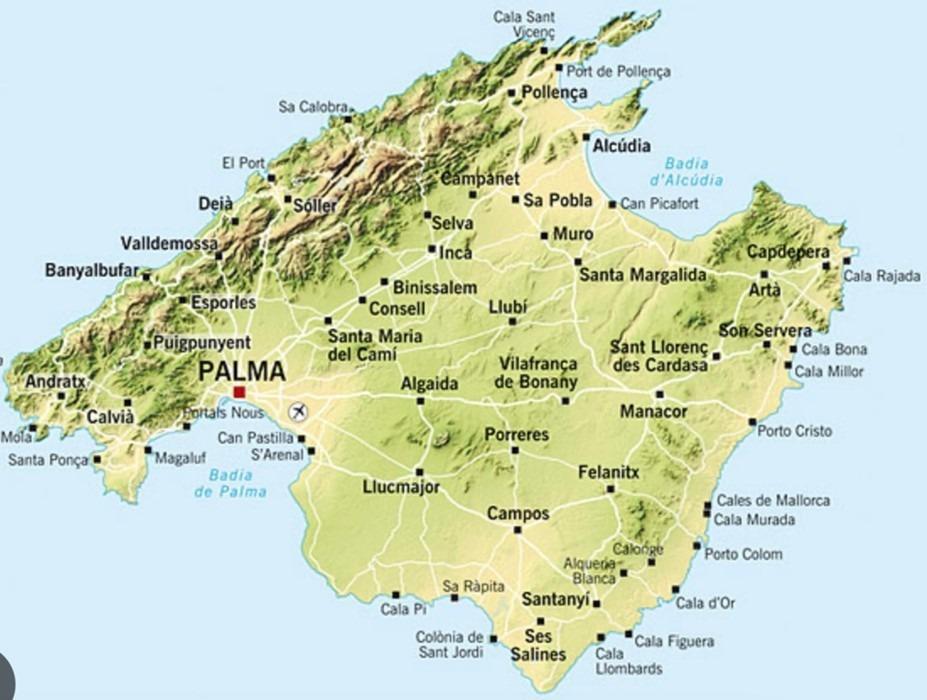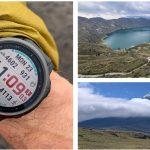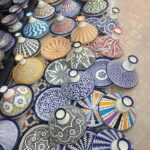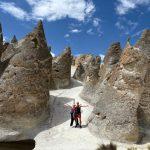(Guest post by John Shaw, cyclist, traveler and gourmet chef)

I can’t count on two hands the number of recent articles that have popped up about cycling on Mallorca, much less the number of people I know who have been there on cycling trips – in some cases more than once! There are many iconic rides, hill climbs, scenic rides and approaches to “riding the island” according to the zeitgeist. For masochists or the very fit there is the Mallorca 312 km Fondo with 4100 m elevation gain day-ride taking in much of the island. The routes vary year to year, from circumnavigations of the island to more mountain-focused rides. There are also road cycling camps, single hub and multi hub & spoke guided and self-guided multiday tour options based out of Palma, Port de Pollença, Sóller and other towns. To each day a mountain pass or scenic loop and a good lunch! Baggage can appear miraculously at each new hotel. Many bars, restaurants, and cafes have long rails to hang saddles from – executive bike parking if you will. Some hotels have elaborate bike rooms (bike washing, charging, repair, and water bottle refilling stations) with individually assigned and secure parking. The weather is great too during the fall, winter and spring, when road-rides in more northern climes are indoors on Swift, Wahoo, Lifecycle or something. Choose a price point. Choose a duration. Book an air ticket!

Palma de Mallorca scenes: cathedral, pleasure boat harbour, Torrent de sa Riera, coastal bike path
Palma de Mallorca
I had a fear-of-missing-out moment when planning a two-month fall 2024 trip to Spain. I scheduled 12 days at the end of October on the island, including an independent 9-day loop ride, to start our trip. We arrived in Palma de Mallorca late on October 20, 2024, following an overnight flight from Edmonton via Amsterdam. We dejetlagged in Palma, spending 3 days on the tourist trail: cathedral, castle, Joan Miro and Modern Art Museums, Centro Historico walks, street art, roof top bars, restaurants. We also found the Che Gelats ice cream shop. They make homemade mango-passion fruit, and multiple dulce de leche flavours, among many others. We enjoyed many flavours on our end-of-day repeat visits. We also did a ~25 km shakedown ride on a dedicated coastal bike path on our rental bikes (Specialized Roubaix for me, Trek Verve ebike, for Tema) from Nano Bikes. The bike path too is a tourist trail thing to do. For us it was also a very practical way to try our bikes before heading out! Be forewarned, the bike path is narrow, has a few tight and blind corners, and is very busy, with a theoretical 15 KPH speed limit in places. I scraped my arm on a wall on the way back avoiding a wayward pedestrian

Day 1: route map, view approaching Valldemossa, view from our restaurant in Deia, us at the beach at Port de Sóller
Day 1 – Valldemossa, Deià, Sóller
(45 km distance / 630 m elevation gain) We left our carry-on bags at our hotel in Palma. Our island tour baggage comprised two small paniers that zip together to make a backpack (we put this on Tema’s ebike), a handlebar bag (on my bike), under-the-saddle repair kits, mini pumps, and of course water bottles. Our bags contained only bare necessities: medications, toiletries, “outfits” for dinner and the beach, energy bars, phone chargers, passports, money, credit cards, and rain gear we never used in the end. We didn’t even bring spare riding kits. We rinsed our kits daily, dried them and wore them again. Our emergency plan was to put a bike and rider into a taxi heading to the nearest bike shop, our hotel, or a hospital! Cellphone coverage is ubiquitous, and towns are no more than 20 km away.
We rode out of Palma on a combination of bike paths and busy roads until we entered the Serra de Tramuntana on the way up to Valldemossa, a charming mountain town. As soon as we got past the intersection with the Ma-1120 on the Ma-1110 we could smell ripening apples on the trees in the roadside orchards. Further up the climb we smelled forest scents.
We stopped at Vallademossa to walk around its Centro Historico and for coffee and a snack. The main square was remarkably crowded for a late October Wednesday morning. We rode on to Deia, another pretty mountain town, for a relaxed lunch on a terrace with a fabulous view, a few meters up from the main road. The bars, cafes and restaurants on the main road were already packed with cyclists by the time we arrived. There is limited parking for cars there! Cars tended to drive right through.
After lunch it was a steep downhill ride on the tight switchbacks of the Coll de Sóller. We encountered very cautious bumper-to-bumper car and bicycle traffic going in both directions. From Sóller it was a short sprint to our hotel on the beach at Port de Sóller – our first purpose-built tourist beach town. We checked-in, put our bikes in the bike room, changed, swam, relaxed on the beach in front of our hotel, showered, napped, ate dinner and were asleep all before 20:30! The impacts of fresh air, exercise and residual jetlag!
It turns out that the route through the mountains to Port de Sóller and back to Palma or elsewhere on the highway in the plain is a popular daytrip for car-based tourists. That and school holidays that week in France and England added to the tourist crush we’d experienced in Valldemossa. We learned later that many tourists with cars select a base on a beach or in a town and do day trips to popular venues from them. Cars and their occupants converge at hot spots, like pretty towns, or vistas, or at pinch points in the road network and then disperse. Cyclists on the island do much the same thing apparently! The Coll de Sóller is a favoured climb/descent, explaining the pelotons of cyclists in Deia. The Coll de Sóller would be a joy to ride if it weren’t for the crowds. We had to focus on the traffic rather than the views or cornering fast during our descent.

Day 2: route map from Port de Sóller to Port de Pollença; road up, one of the tunnels, and view from the summit of the Puig Major
Day 2 – Port de Sóller to Port de Pollença
(60 km / 1150 m) This was our longest and most challenging day. We were on the road by 10:00 a.m. We rode up Puig Major from Sóller breathing wood smoke from homes. At specific elevations the smoke was quite dense and not welcomed by two asthmatics! Car and bike traffic was light. We intersected summits for Sa Calobra and Coll de Sa Batalla. I could easily have constructed additional day rides from Port de Sóller that included them. Taking the ferry between Port de Sóller and Sa Calobra alone offers several possibilities.
Near the summit of our route to Port de Pollença, there is a snack/drink kiosk. Hundreds of cyclists gather there for well-deserved breaks and to enjoy views. The other two hill climbs are more popular with cyclists than the one we took.
While much of the rest of the ride to Port de Pollença was downhill, there were a few “bumps”. Tema ran out of power on the second to last one. Luckily for us, once she got over the bumps the balance of the ride had a minus 3% grade. We almost floated to our destination. Tema was still glad to be off her bike though. Port de Pollença is also a purpose-built tourist beach destination with hotels, bars and restaurants lining the pedestrianized seashore. We checked-in for a 3-night stay, put our bikes in a deluxe bike room shared with another hotel, changed, swam, relaxed on the beach in front of our hotel, showered, napped, ate dinner and were asleep this time by 21:00!

Day 3: Out-and-back cycle route from Port de Pollença to Cap de Formentor, professional action shots of both of us
Day 3 – Port de Pollença to Cap de Formentor
(40 km / 830 m) We did an out-and-back ride from Port de Pollença to Cap de Formentor late morning. This is an iconic ride on Mallorca, especially when coupled with a ride around to the other side of the bay to Mirador Victoria. The ride to the lighthouse includes short hills, fabulous views and strategically placed professional photographers who take pictures of hundreds of cyclists per hour at two locations. If you go, be sure to spot the photographers to get the best photos and remember the time you passed them, if you want to look at – much less purchase – a photo without scrolling for hours to find yourself among the hordes. During the summer, cars aren’t permitted on the road out to the lighthouse, only bikes, buses, and people on foot. The day we rode, there was a lineup of cars perhaps half a kilometre long stretching back from the lighthouse along switchbacks, with little or no opportunity for drivers to back up or to turn around. We spoke with our bike rep at Nano Bikes once back in Palma and he said he’d been stuck there for most of a day the one time he drove. By bike it is easy to reach and then to return from the lighthouse, and to enjoy the experience despite the crowds. Just don’t expect to cycle quickly. Once back in Port de Pollença, we had lunch at a restaurant on the beach, swam, lolled and had a quiet evening.

Day 4: Out-and-back cycle route from Port de Pollença to Mirador Victoria, view of Cap de Formentor from Mirador Victoria, a back road east of Alcudia, our deluxe bike room in Port de Pollença
Day 4 – Mirador Victoria
(35 km / 330 m) It rained all morning. After breakfast I lost to Tema at cards and at chess. We then had lunch before riding to and from Mirador Victoria and the coast road beyond during the afternoon. It was on this ride we first became acquainted with the warren of paved and dirt back roads and lanes on the flatter parts of the island. While not always marked, they can be great ways to avoid heavy traffic, particularly on roads labelled Ma-##.

Day 5: panniers on Tema’s bike, back road and walking route signs, Platja Coll Baix, church in Alcudia
Day 5 – Platja Coll Baix & Alcudia
(24 km / 210 m) After breakfast we packed up for our ride to Alcudia. After three nights in Port de Pollença we were ready to move on. As we dropped our room key off at the front desk, we realized the staff at our hotel were having their end of season farewell brunch on the terrace. By the end of the day, the hotel would be shut until April 2025.
Alcudia is an ancient walled town, with its own Roman ruins, and Arab traces – including its name. We stayed at ARA – a small hotel within the walls. Space is at a premium. Our hotel arranged for us to have a ground-floor level-entry room with plenty of space for our bikes. We arrived late morning on a market day (Sunday). The town was mobbed. We dropped our pannier at our hotel and headed out on a ride to Parque Coll Baix (partly on a dirt/gravel road), and then hiked (4 km / 200 m) to and from a beauty spot. We’d intended to go as far as Platja Coll Baix (a beautiful beach) but the last 400 m required bouldering in bike shoes. That was not happening. We missed the Museu sa Bassa Blanca but got back to town as the outdoor market sellers were packing up, and enjoyed a late lunch, really an early dinner, at Ca’n Pantina – cod fish stew for me, roast lamb for Tema, and a local wine (Ribas – a blend of premsal and giro ros grapes). We had dessert too! Later, we explored the town on foot.

Day 6: Scenes from Alcudia, and John at lunch
Day 6 – Alcúdia & Platja de Sa Font de Sant Joan
(10 km / 20 m) It rained heavily overnight and the weather was still iffy early in the morning. We were walking on top of the curtain wall of the old town as the sun came out and the clouds disappeared. We declared it a beach day, rode to Platja de Sa Font de Sant Joan, and were back in town again for another late lunch. Few restaurants are open on Mondays. We ate different items from the same menu as on Day 5 without complaint!

Day 7: route map from Alcudia to Arta; Tema peeking out at the Santuari de Sant Salvador, the garden vista and dinner at hotel Jardi in Arta
Day 7 – Alcudia to Arta
(46 km / 500 m) We rode under threatening skies mostly against a headwind in heavy but well-behaved traffic to Arta, a hilltop town in the southeast of the island. Tuesday is market day there. We added Colonia de Sant Pere, a sleepy seaside village, to our itinerary at the suggestion of staff at our hotel in Alcudia, arriving just as the street stalls were coming down and the crowds were thinning.
Our hotel, Jardi d’Arta, was superb. We could easily have stayed there a couple of nights to enjoy the garden, pools and spa with spectacular views. We were lucky enough to score a table in their restaurant for dinner where we shared six art-on-a-plate dishes paired with Ca’n Sort Viognier wine from Felanitx (a nearby town). As I wrote in my booking.com review: “Book this hotel if your budget permits. The value is exceptional.” The town is charming too. We walked along the pedestrianized main streets, and up to the Santuari de Sant Salvador before dinner.

Day 8: route map from Arta to Algaida, one of the tunnels on the converted rail bed, the cathedral at Manacor with restaurant Zero Pi in the foreground
Day 8 – Arta to Algaida
(67 km / 450 m) After the best breakfast we had on the island, we set out from Arta to Algaida. The first 30 km of the ride (as far as Manacor) were on a converted rail bed. The route is promoted for leisure cycling. Some stretches were rough and washed out from recent rains. Others were a car-free dream. The balance of the ride was on quiet and windy country roads. We preferred those. In hindsight we should have ridden them from the start.
We took a break near the cathedral in Manacor. We had fresh juices and lattes at Zero Pi where we encountered other foreign cyclists on day rides. The ones we chatted with were cycling from a beach resort. There are several short but steep hill climbs between Manacor and the nearby coast that are readily combined to make a great day out.
We took a second break at a locals’ bar in Porreres for a rest, sandwiches, and a beer in my case. We arrived at Petit Hotel Algaida late afternoon. We were more interested in a shower and a nap than the pool, and garden. The staff knew we’d be arriving by bike and gave us a ground floor suite with plenty of room for us and our bikes.

Day 9: route map from Algaida to Palma, a nice stretch of the mountain bike trails, an antiquated water pump, Bendito Gusto – a great new pasta lunch spot in Palma
Day 9 – Algaida to Palma
(32 km / 150 m) Trying to avoid stints on highways as we closed the loop back to Palma we somehow ended up on a mountain bike trail for 4 km. Our ride had been going along smoothly on back roads. At a turn, the road we were intended to take was quite narrow, barely wide enough for a car. We balked, then verified that this was the intended “bike route” and plunged in, at times quite literally. There were flooded sections. We trudged on foot for about 2 km and I pushed Tema’s heavily-laden bike for her over tough patches. When we got to the other end there was a sign: only suitable for mountain bikes! Our morning adventure was over. Shortly after, we were sunning and swimming at a beach along the coast. All was forgotten or at least forgiven.
Our last 12 kilometers were on the coastal bike path we’d ridden to test out our bikes. We returned our bikes to the bike shop shortly before their 14:00 closure, walked back to the hotel we’d stayed in at the beginning of our trip, checked in, showered, changed and ate a proper homemade stuffed pasta lunch at Bendito Gusto to celebrate the end of our tour of Mallorca by bike. The next afternoon we departed for Malaga but not before one last visit to Che Gelat, and a rain delay on the tarmac as the storm that devastated Valencia passed overhead.
Mallorca – A cyclist haven?
So, is Mallorca a nirvana for cyclists? For hill-obsessed climbers and descenders, there are incredible opportunities to work on and to test their mettle in the mountains on the north side of the island. To have open road experiences, particularly for “top 10” or “iconic” rides, cyclists need to be out early – think dawn or at least before breakfast! For Tema and me, cycling is one part of our travel experience. We are equally interested in the food, wine, architecture, culture, art, history, beaches, and people we encounter along the way. On Mallorca, we were looking for quiet end-of-season cycling, little car traffic, great scenery, good enough weather, uncrowded beaches, great local food and hotels, seawater warm enough for swimming, old towns to explore – the whole package! “You can’t always get what you want but … you might … get what you need” to paraphrase the Rolling Stones would be an apt description of how things turned out. We had great experiences and have wonderful memories but also saw firsthand the impacts of over-tourism – on Coll de Sóller and at Cap de Formentor.
What would we have done differently? As to timing, it would have been nice to have avoided the English and French school holidays. As to routing, there are always choices to make when planning a trip. Tema is not as cycling and hill-focused as I am. Cycling ten days in a row, regardless of distance, is a lot for her. Hence the need to strike a balance so we both have a good time. We have no real regrets other than the 4 km on the mountain bike route, and perhaps a few kilometers of the converted rail track! We could have spent an extra day at Port de Sóller. We could have cycled to the far northwest of the island. That is where the toughest climb on the island is located. We wouldn’t have wanted to miss spending at least some time in Palma, Alcudia and Arta though. We had our best culinary and cultural experiences there! You can’t do everything during one short visit. Perhaps that’s why people return. The jury is still out for us on that. Our next cycling adventure will be among grape vines in Chile. Who knows what else the future holds for us?




